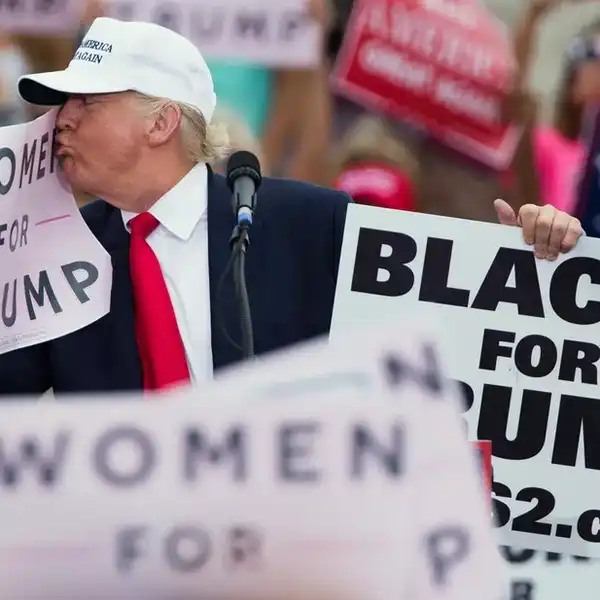As a pseudo-political and religious scholar with little rooting interest last week, I was able to objectively think about what made the presidential election so unlike any other, despite my previous words on why the election was much broader as a whole.
But after thinking about what I have witnessed on social media, in conversations with peers, and from afar, I came to this conclusion regarding the state of the Religious Right, the two-party system, and the American political balance:
For the last ten years, the American political balance has found itself in a state of contrast. On one hand the Republican Party is trying to appeal to their far-right base and populist surge while maintaining their right-of-center establishment presence. But on the other hand, Democrats are keeping their influence on electorates like women, minorities, and educated elites. However, both parties today are faced with the task of catering to a dynamic population of evangelical voters, all of which desire their own political agenda. This religious electorate is often one of the most vocal and dedicated of them all, so neither party can afford to alienate them without electoral or political consequences. Despite not being overtly-religious at all, Donald Trump was able to win the presidency in 2016 by appealing not only to independent voters across the Midwest, but also these evangelical voters in the South, due in part to Hillary Clinton’s own failures to reach religious voters and non-college educated individuals.
Leading up to the primary season for both parties, perhaps Clinton and Jeb Bush were the favorites to win their respective nominations. But when Trump rode down that Manhattan escalator, he entered a primary race full of evangelical candidates on the Religious Right, whether that be Mike Huckabee, Rick Santorum, Ben Carson, or his biggest rival, Ted Cruz. During stump speeches across New Hampshire, Iowa, and South Carolina, Republican candidates made religious liberty a key issue. In November 2015, Huckabee attended and spoke at a controversial religious conference in Des Moines. Later, Cruz held a “Rally for Religious Liberty” in February with the Christian band Newsboys.
Although Trump did participate in similar events, like the Liberty University Convocation, he did not make religious liberty a significant component of his campaign. Rather, President-elect Trump focused on securing independent voters who were dissatisfied with the status quo of Washington among the elites. This electorate tended to be made up of white blue-collar rust-belt workers with no college education. But yet, even with this clear appeal in states like Ohio and Pennsylvania, Trump easily carried the evangelical Bible Belt on his way to victory without expressing any overtly religious behavior.
As the dust settles on the Democratic ticket, they must address several ineptitudes. Among these newfound weaknesses include the consistent failure to earn significant portions of evangelical and religious vote. According to exit polls from this week, Trump beat Clinton 81% to 16% in the born-again electorate. Likewise, Trump had 60% and 52% of the overall Protestant and Catholic vote respectively. Of those who attend church weekly, he won 56% of the vote, compared to Clinton at 40%. Even more indicting, Trump won 61% to 25% among all Mormon voters despite having harsh words for Mitt Romney, Evan McMullin, women, and people of that certain faith. However, this is not only a 2016 problem for Democrats in recent presidential elections. Since 2004, Democratic candidates have mustered 21%, 24%, 21%, and now 16% of the evangelical vote. Ultimately, this failure comes down to their inability to appeal to the highly-religious voter because of varying stances on social matters as well as an overall unimportance placed on such religious dialogues.
Generally speaking, the Democratic platform in the 21st Century appeals toward social causes like gay rights, abortion, and contraception that tend to create friction with the evangelical base. In recent years, this conflict has played out in cases such as Kim Davis not issuing gay marriage licenses in Kentucky and Planned Parenthood’s alleged misuse and sale of natal organs in aborted infants. While Democrats have come out against Davis, they have defended Planned Parenthood despite Republican attempts to defund it. These actions, in combination with others, have helped create such a divide between modern Democrats and evangelicals. Highly dedicated evangelical voters will be more apt to vote Republican if they think religious liberty and the right to life are protected more by that party. This is not to say that party ideology and religious adherence are mutually exclusive, but rather that they often go hand and hand socially.
Ironically, however, Trump was not too vocal on many of these issues, but yet he still won large portions of the evangelical vote. When faced with a choice between Clinton and Trump, Christian voters continued to choose Republicans because the evangelical base has moved so far away from the Democratic platform, regardless of the fact that neither candidate was overtly vocal about their religious beliefs. Although despite this growing gap between Democrats and evangelicals, President Barack Obama was able to win two elections by taking significant numbers of votes in the minority and unaligned electorates, which outweighed others taken by John McCain and Romney respectively.
In 2016, President-elect Trump rebuilt the Reagan Coalition and attracted a mix of blue-collar workers in the Rust Belt and populist Americans in the Midwest frustrated with the stagnation in Washington. While Democrats kept their base of minorities, women, and educated people, they lost the white and evangelical vote to the Republicans. After choosing not to overwhelmingly support Clinton, this dedicated and vocal group of evangelicals joined Trump’s victorious movement despite his lack of religious fervor, proving yet again the failures of Democrats to appeal to religious voters.




















